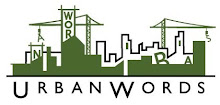Tuesday, 9 December 2008
More thoughts on consultation
On the other hand I found the event frustrating. That might be because of the lack of opportunities for discourse and conversation (a bit ironically!) which I suspect were due to keeping the launch short and sweet. But it was also born from my feeling that surely local government can't have only just woken up to the fact that we should talk to people, find out what their lives are like and what could make them better. If that is the case, I find it both remarkable and depressing.
My final frustration was with the exercises we did as a way of demonstrating how this kind of consultation can work. One of these involved being given 3 blue stickers and choosing 3 out of 6 statements as being the most significant issues faced by local authorities conducting consultations. You put your stickers on the 3 most important issues. And that was that. I buy the argument that this can work as an activity that doesn't feel too difficult or time intensive, or laborious, and therefore it's accessible to people who might otherwise not engage with consultation activities. However, 2 of the choices were: 'complex subject matter' and 'tickbox culture'. To me they are the same thing: the desire for easy clear answers and the fact that such answers are perhaps impossible and maybe misleading. There was no space for me to voice this. There was no subtlety or complexity in the exercise. Maybe I'm being naive. Maybe it's about having a range of activities that range from the do it in a couple of seconds straight forward answer, to something more complex, and through that variety we put together the bigger picture. But I wonder if we are dumbing down, if we are assuming that people who don't usually take part in consultation can or will only do activities that are non-complex.
I hate to feel like a cynic, and I appreciate that we need to be exploring different ways of doing things. Perhaps the issue was that we didn't get to explore the complexities at the launch event which left me with this frustration, I'm not sure...
Anway, you can find more info on Say and Play on the Involve website, here.
Friday, 5 December 2008
Ameliorating Amelia Street
Tuesday, 2 December 2008
Creative Writing and Consultation
Thank you to the 20 people who came to the creative writing and consultation event hosted by Create KX at the School of Life on Wednesday 19th November. I found the workshop really interesting, especially the mix of people, ideas and approaches within that one room.
I wanted to post up some of my notes from the session as a way of reflecting and sharing the thoughts generated over the 2 hours.
Where does it end?
A conversation that really struck me was around the question ‘where does consultation finish?’ Are we stymied by the idea that consultation is something done to a group of people and then finished with? Instead, should we be looking at consultation as an ongoing process, something which is done with rather than done to? I wonder if our project-driven arts funding and our society’s need to ‘finish’ things (ok, that’s a grand statement, but I think there’s some truth in it) makes it problematic to argue for the ongoing. Maybe because we’re not sure how to measure its successes? I’m not sure.
What can writers offer?
We talked about writers working as translators, finding ways of crossing the communication gap between those involved in regeneration. We also talked about them as interpreters.
Here’s one of the communal pieces of writing we created with Aoife:
Candyfloss
Earl Grey, because I’m worth it
The smell of your skin on an autumn evening
Would you like to come for dinner?
Birdsong and Gravel
Home-full and home-less. So blessed and so confused by having two homes separated by sea. Home is love, but loves are split too. Home is somewhere between my father’s and my husband’s arms.
A bit of politics:
Someone raised the interesting issue of how creative writing might take a role in critiquing and challenging the bureaucracy and politics of regeneration. How might that work? And how might that be funded? We circled that question too – how does who’s paying affect what we do? Might we end up doling out propaganda rather than opening up genuine debate?
We touched too on the ethics of what happens afterwards, who takes responsibility for the listening that is needed if consultation is to work.
What’s important?
~ Doing with not doing to
~ Not going into the process with an idea of what the answer should be
What’s needed?
~ Really robust case studies that can be used to convince (maybe reluctant) organisations to engage with this method of working
~ Effective communication - people won't work in this wayif they don't know about it
I’m interested in this idea of case studies, perhaps in trying to get a project off the ground that sets out to consult in this way and explore and document the possibilities. And then the communication of that knowledge and experience comes second, giving people the confidence and skills to find their own ways of engaging with creative writing and consultation.
Monday, 1 December 2008
Professional Development and Support
UrbanWords is looking to develop a programme of professional development and support in the field of writing and regeneration. In order to plan an appropriate and useful programme, we are asking a broad range of professionals interested in this area about their training and support needs and ideas.
Please click here to take survey by Monday 22nd December, and please pass the link on to any contacts who might be interested.

